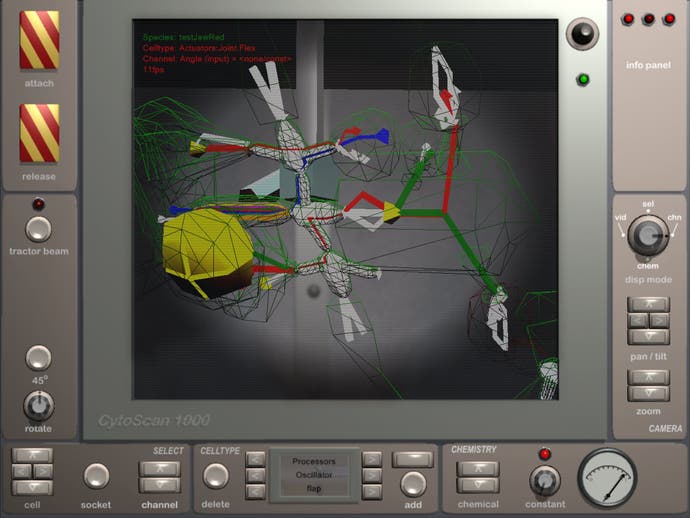Saviour Machine
AI master Steve Grand talks Creatures, Spore and Simbiosis.
SHODAN may have been scary, but she's got nothing on Lucy. The fun-size pocket robot orangutan may now be consigned to Cyberlife Research vault, but the artificial intelligence comprising her virtual brain - which her creators hoped would see her through real-life kindergarten - is of a level of sophistication that makes Looking Glass' amalgam of clever scripting, voice-acting, and cut-scenes look utterly prehistoric. And while she certainly wasn't blessed with SHODAN's looks, either - in all honesty, she looks like a cross between Estelle Getty and Chucky the Lakeshore Strangler - there's little doubt Lucy's probably the better dinner party guest.
This is the case for most, if not all, of the videogames industry's flaccid attempts at AI. Whilst gaming is constantly reaching new graphical frontiers, AI remains a criminally neglected facet of development - despite its importance and potential ability to revolutionise games design. "The majority of what's called 'AI' by games programmers is just logic," Steve Grand, Lucy's chief architect, says, "or simple rules for behaviour. It bears little relationship to the kinds of AI being developed in research labs. And the rest is what's lovingly called 'Good Old-Fashioned AI' by those of us who despise it. If something is acting according to explicit rules then it isn't intelligent. Intelligence is when you make up your own rules, infer them from experience, or choose to break them."
Grand, as you will probably know if you've at least two decades under your belt (hey, remember Milli Vanilli?) is the computer scientist responsible for Creatures, the AI-driven life simulator (and surprise hit) released in its first iteration in 1996. Creatures tasks the player with teaching and guiding little creatures (known as Norns) to maturity and independence. Norns weren't mere Lemmings - they were coded from the genetic level upwards and featured the first example of proper neural network brains in what you could loosely call a videogame. (Grand avoids the term entirely, preferring "simulation".)
Creatures was, in many ways, a revolution. Which is perhaps why you might be able to understand why Grand is so chagrined when it's compared to other simulation-style videogames. "They are trying to mimic the sorts of simulations I do," he explains. "I'm not really interested in computer games - I'm a scientist and I'm interested in what intelligence, life and minds really are. If you just write a simulation that looks on the outside like it's alive, that doesn't actually make it alive or tell you very much about the nature of life. And from a practical perspective it doesn't deliver the goods either - it only ever works up to a point.
"There are two kinds or orders of simulation. If you write equations that behave like an economy, then it's a first-order simulation of an economy and it merely mimics a real economy. If you write equations that behave like little people who can trade with each other, you have only mimicked those people. But if the pretend people then start to trade and the end result behaves like an economy, then this is a second-order simulation and there is an important sense in which the result really is an economy. It's also more likely to reflect reality than the simpler model, because you often get a lot of features for free."

To date, though, most developers opt for the easier option; beyond cost considerations, the general consensus seems to be that players only really want to be entertained, and won't bother prodding the simulation to breaking point if it requires too much thought. "And as a result," Grand continues, "games have reinforced the idea that intelligence is directly related to logic and that human behaviour is comparatively easily reduced to simple IF/THEN constructs. And people are easily fooled, up to a point. If you make something that looks spectacularly like a duck, using the best pixel shaders for feathers and translucency, and then you program it to quack every now and then, it's surprisingly easy for people to assume you've made a duck. I would prefer people to understand just how complex, astounding and sublime natural intelligence really is, and game AI tends to give the wrong impression."
In many cases, that's not such a big deal - after all, the complexity and beauty of a duck's natural intelligence is a suborder consideration when you're gunning over its spine in Gran Turismo. But Spore brought the issues of AI and life simulation back to the fore. Spore, after all, was fun, but it was a somewhat Fisher Price version of life simulation, and disappointed critics and gamers who felt the pre-release hype was hinting at a more complex game.
Interestingly, Grand was developing Simbiosis at roughly the same time. It was broadly similar to Spore in thrust, but his project looked a lot more like what the disenfranchised aforementioned had envisioned than Maxis' game. "I met Will Wright just before I started Creatures," Grand recalls, "and so I knew he thought in a very similar way to me, and liked creating emergent simulations. So, all the time, while I was developing Simbiosis by myself, I was terrified of what Will was going to achieve with dozens of programmers and artists. But in the end it seems like Spore is more of a mimic of life than an implementation of it."
